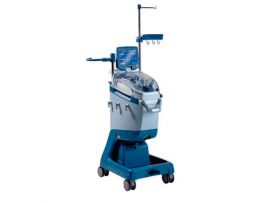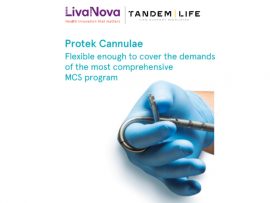Abstract Introduction Cardiopulmonary bypass (CPB) is essential for cardiac surgery but poses risks, including gaseous micro emboli (GME). While the incidence of stroke—a common clinical consequence of embolism—ranges from 1-5%..
Read MoreAbstract Extracorporeal membrane oxygenation (ECMO) is a crucial support for patients with severe cardiac or respiratory failure, but its availability is limited, often requiring patient transport to specialized centers. Only..
Read MoreAbstract Aortic surgeries are associated with intraoperative blood loss, often requiring allogeneic blood transfusion. Therefore, blood must be viewed as a scarce resource that carries risks and benefits. Many preoperative..
Read MoreAbstract Objective The outcomes of COVID-19 patients on venovenous extracorporeal membrane oxygenation (VV-ECMO) varied. We aim to investigate the variability concerning location and timeframe. We conducted a retrospective analysis of..
Read MoreAbstract Background Evidence for the effectiveness of the Sonoclot analyzer in improving clinical outcomes in disseminated intravascular coagulation (DIC) is lacking. Objective To evaluate the effectiveness of an algorithm based..
Read MoreAbstract Background Cardiac surgery is associated with increased risk of major adverse outcomes. Venous to arterial carbon dioxide tension gap (Pv-aCO2 gap) showed significant prognostic value of non-cardiac surgery, while their..
Read MoreAbstract Background: Cardiopulmonary bypass (CPB) and extracorporeal membrane oxygenation (ECMO) are widely used. Previous methods to reduce inflammation have shown inconsistent results. We developed a cytokine adsorption column using polymethyl methacrylate..
Read MoreAbstract Objective This study aims to evaluate the operational feasibility of a self-designed minimally invasive extracorporeal circulation integrated circuit (miECC) type IV system and to assess the effectiveness of the..
Read MoreAbstract Purpose Neonates undergoing cardiopulmonary bypass (CPB) are at a high risk of a systemic inflammatory response leading to cardiac, respiratory, and renal dysfunction due to their small body size..
Read MoreAbstract Objective Cardiac arrest happens in 0.7%-5.2% patients after cardiovascular surgery, and cases with asystole or severe bradycardia need timely temporary pacing. However, routine temporary pacing wire insertion in cardiopulmonary..
Read MoreAbstract Introduction Congenital cardiac defects disrupt circulation and oxygenation due to structural changes in the heart. Tetralogy of Fallot is the most common cyanotic congenital heart disease, accounting for 5..
Read MoreAbstract Background Venoarterial extracorporeal membrane oxygenation (V-A ECMO) use to support patients in cardiac failure is increasing. Despite this increased use, predicting successful weaning from ECMO can be challenging, no..
Read MoreAbstract Oxygen is crucial for mitochondrial energy production in neurons and is efficiently stored and transported within the hydrophobic core of phospholipid bilayers. Using a diffusive model derived from molecular..
Read MoreAbstract Rationale: Randomised clinical trials in intensive care often prioritize disease-focused outcomes rather than patient-centred outcomes. Objective: To report and evaluate the ‘Daily Organ Support for patients on extracorporeal membrane..
Read MoreAbstract We established a compact machine perfusion system for whole blood perfusion of rat liver by making use of oxygenation filters as an artificial lung. Livers removed from rats were..
Read MoreAbstract Introduction Cardiac arrest in the emergency department (ED) is a rare event. Prior studies have used dedicated cardiac arrest registries, but few have leveraged “big data” from electronic healthcare..
Read MoreAbstract Protamine is widely used after catheter ablation to achieve hemostasis. Anaphylaxis to protamine is a rare but severe complication. A 49-year-old male patient underwent catheter ablation of symptomatic long-standing..
Read MoreAbstract The operating room is often viewed as a high-stakes, technical, and intensely specialized environment. While clinical precision and technological advancements have greatly improved surgical outcomes, one critical element remains..
Read MoreAbstract Purpose: The Placenta Accreta Spectrum (PAS) poses a significant obstetric challenge, often leading to life-threatening hemorrhage during delivery. Intraoperative Cell Salvage (IOCS) is a promising but insufficiently studied blood conservation..
Read MoreAbstract Objectives: Previous studies have shown that inaccurate peripheral oxygen saturation (SpO2) readings compared with arterial oxygen saturation (SaO2) may occur in extracorporeal membrane oxygenation (ECMO) patients. We hypothesized that..
Read MoreAbstract Venovenous extracorporeal membrane oxygenation is the most commonly used mode of support in pre-lung transplant recipients. In patients who experience right ventricular dysfunction, venopulmonary ECMO is an excellent option..
Read MoreAbstract In neonates with pulmonary hypertension (PH) supported on veno-venous extracorporeal membrane oxygenation (VV-ECMO), keeping the ductus arteriosus (DA) open ensures a high cardiac output of well-oxygenated blood through the..
Read MoreAbstract Donation after circulatory death (DCD) is driving the increase in deceased organ donors in the United States. Normothermic regional perfusion (NRP) and ex situ machine perfusion (es-MP) have been..
Read MoreLung Harvest in Patient with multiple rib fractures and usage of. Dr.Sam Zeraatian Nejad Davani, CEO of rockingham medical research ADKWA center as well as Head of IUMS transplant..
Read MoreLung Harvest in Patient with Unilateral PAPVC. Dr.Sam Zeraatian Nejad Davani, CEO of rockingham medical research ADKWA center as well as Head of IUMS transplant and cardiovascular surgery department...
Read More[playlist ids="49848"] Dr.Sam Zeraatian Nejad Davani, CEO of rockingham medical research ADKWA center as well as Head of IUMS transplant and cardiovascular surgery department. ..
Read MoreAbstract Introduction: In life-threatening conditions like severe acute respiratory distress syndrome (ARDS), rescue interventions like extracorporeal membrane oxygenation (ECMO) should be initiated urgently to resolve an otherwise potentially adverse clinical outcome...
Read MoreAbstract Extracorporeal membrane oxygenation (ECMO) traditionally has been used under deep sedation and mechanical ventilation. However, recent advancements have led to the development of awake ECMO strategies, allowing patients to..
Read MoreAbstract Objective The use of an intra-aortic balloon pump (IABP) has been suggested to unload the left ventricle while on venoarterial extracorporeal membrane oxygenation (VA-ECMO) for cardiogenic shock (CS), leading..
Read MoreAbstract Objectives To summarize evidence regarding intravenous angiotensin II administration in critical illness and provide an updated understanding of its effects on various organ dysfunction and renin-angiotensin system (RAS) biomarkers...
Read More













